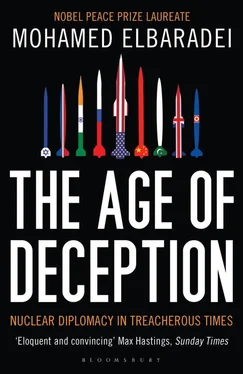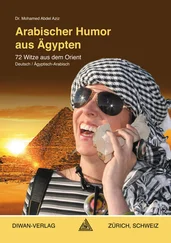“This is not the way to go,” I told him. “The least you should be doing is to contact the Agency, so we can help you do an objective national energy assessment, to evaluate the economics, the safety, the environmental aspects. Any other country would be doing this.” I was quite blunt, particularly because of the safety considerations. I reminded him of Egypt’s history of major train and ferry accidents. Nor was its past record on nuclear safety reassuring. The IAEA had told Egypt more than twenty years earlier that its radiation protection law was not up to standards. In a number of incidents, Egyptians had been injured by undue exposure to radiation sources, and the government still had not updated the law according to the Agency’s recommendations. [2] In fact, the law was only adopted in 2010.
Nuclear power, I told Younes, was not to be taken lightly. Before operating a power reactor, Egypt would need to build the necessary legal, safety, and human resource infrastructure.
Younes said he would write to ask for full IAEA assistance, which he did. I was happy for the Agency to carry out studies to help Egypt approach the topic in a methodical and scientific way. Previous IAEA studies had indicated that Egypt’s existing research reactors were severely underutilized. To advance nuclear science and technology in Egypt and consider the merits of nuclear power as part of the country’s energy mix, the starting point should be to make greater use of the country’s existing facilities. I also advised Younes that Egypt should think about nuclear power development only in terms of the country’s energy needs.
I had the opportunity to reinforce this view in a meeting at Davos with Mohamed Rachid, the Egyptian minister of foreign trade and industry, one of Cairo’s most competent government officials. The most important thing about the nuclear power option was not to rush, I told him, but to conduct the appropriate feasibility studies, including consideration of existing oil and gas resources, siting, and financing. “Even if you decide you need nuclear energy,” I said, “you might need another decade or so just to build the necessary infrastructure.” Rachid said he would convey my views to the president—and indeed, not long after our discussion, the tone of the discourse about nuclear technology became more balanced in the Egyptian media.
Egypt’s erratic engagement with the IAEA on its nuclear program recurred in 2009, when the Agency attempted to clarify the origin of high-enriched uranium particles found in an environmental sample taken at the Inshas Nuclear Research Center. The Egyptians indicated they thought the source was contamination from an imported container.
A statement about the HEU particles made at an NPT conference by Vilmos Cserveny, the Agency’s head of external relations, infuriated Cairo. Vilmos had judged, without consulting me, that transparency required reporting the matter to the conference. The information was about to be published, at any rate, in the Agency’s safeguards report a couple of weeks later. Vilmos wanted to avoid fueling accusations that, because I was Egyptian, I was acting in a way that was less than transparent—a theme that was already circulating in some media reports.
Cairo sent a letter via Egypt’s ambassador to the IAEA, Ihab Fawzy, accusing the Agency of disclosing classified information and making a statement that was technically and factually incorrect in a political forum. This action could only be interpreted, they wrote, “as either a lack of professional competence or ill intention.” Further reactions from Cairo were disjointed: the Foreign Ministry spokesman told the press that the issue of HEU particles was “old and erroneous.” [3] “Egypt Rejects Reports of Nuclear Probe,” Agence France-Presse, May 7, 2009.
But the next day, the Egyptian Atomic Energy Agency said the IAEA and Egypt were working to clarify the source of the particles.
Handling Egyptian nuclear issues was, of course, particularly delicate for me: the Egyptians suspected that I was being extra hard on them, perhaps to reinforce the Agency’s credibility. From time to time, the Western media speculated on whether I was extra soft on Egypt. But of course I acted as I would have with any other country, striving to reach decisions with the greatest possible independence and objectivity: I emphasized to my colleagues at the Agency to apply the same standards to Egypt’s nuclear file as to any other.
At any rate, the letter from Cairo angered me. The Agency’s statement had been factually correct. I reminded Fawzy of the mess we had handled several years earlier. “Egypt did not even have a competent authority with a comprehensive knowledge of nuclear materials and activities in the country,” I told him. “The Agency had to go out of its way to help you get your house in order.” I asked him to officially withdraw the letter. Otherwise, I said, I would provide the IAEA Board with a response that included a detailed account of the incompetence we had needed to deal with.
Fawzy was taken aback. Within a day we got a different letter, one with no offensive mention of ill intentions or Agency incompetence. We answered professionally and courteously, explaining the technical and factual basis for the Agency’s statement.
Egypt’s focus on nuclear technology was illustrative of much of the Middle East. While it was true that Egypt needed more energy—specifically, more electricity—and while the Egyptian interest in nuclear power dated back to the eighties, the country’s more recent move to incorporate it into its energy mix was, in my view, to a certain extent due to the nuclear tensions unfolding in the neighborhood. Apprehension about Iran’s program had started to shape the region’s thinking; an increasing number of Middle Eastern countries were approaching the Agency about introducing nuclear power. Paradoxically, the furor over Iran’s program had ignited enthusiasm for nuclear technology. No one wanted to lag behind. And without a doubt, the greatest source of frustration and anxiety was the regional asymmetry of military power symbolized by Israel’s nuclear arsenal.
The case of Israel and its nuclear program was peculiar. Like India and Pakistan, Israel was a member of the IAEA but not party to the NPT, thus the Agency inspection had no authority in the country. Even so, given the ongoing tensions in the region, the other IAEA Member States had officially requested that I consult with Israel on the application of safeguards to its nuclear facilities and to discuss the potential for establishing a nuclear-weapons-free zone in the Middle East.
I was scheduled to meet with Prime Minister Ariel Sharon in July 2004. Not long before my trip, I received a threat via an email addressed to Aida. If I were to come to Israel, it said, Aida would be made a widow. [4] This was not the first threat I had received. A few years earlier the Egyptian authorities had received information that a militant Egyptian group was planning to target Egyptian public figures abroad. I was on the list. The Egyptian ambassador to Vienna, Mostafa el-Feki, informed me and the authorities in Austria. For a time I was given increased security, but nothing came of it.
We investigated the origin; the message had come from somewhere in Israel or the Palestinian Territories. We gave it to the Israelis to investigate and went ahead with our plans regardless.
Sharon’s office was impressively modest in comparison with those of other heads of state, particularly in the Middle East. Security guards with submachine guns were milling around as we sat in the waiting room, which faced the restrooms. Sharon’s office was small, and two secretaries shared an even smaller adjacent office. We sat around Sharon’s desk, which served as the conference table. [5] Gideon Frank, the director general of the Israel Atomic Energy Commission, attended the meeting, as did Sharon’s chief of staff, Dov Weissglass, and his military adviser.
Sharon approached in a crumpled suit, taking my hand in a big, firm grip and speaking in a soft voice with a heavy Israeli accent. His demeanor gave no hint of his ruthless military career—indeed, he talked with pride of his life as a farmer.
Читать дальше












